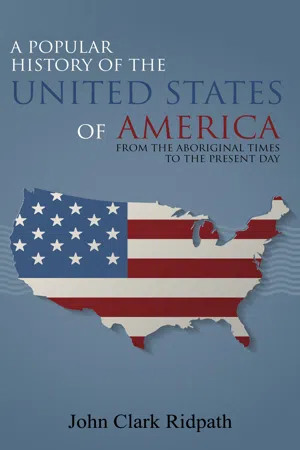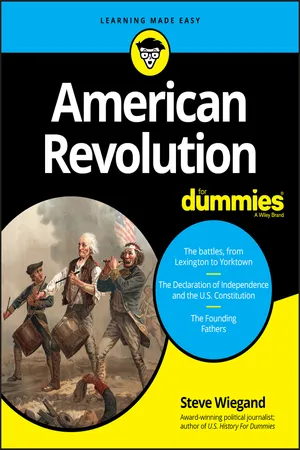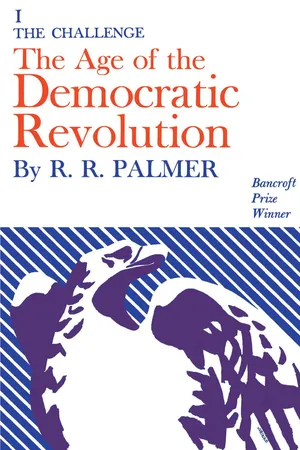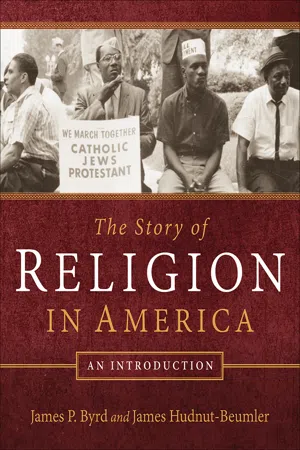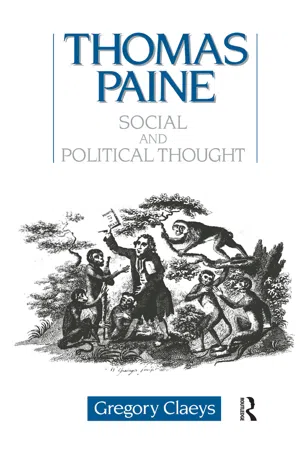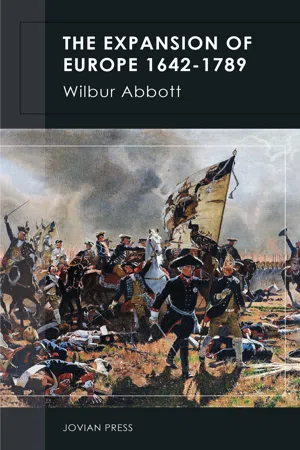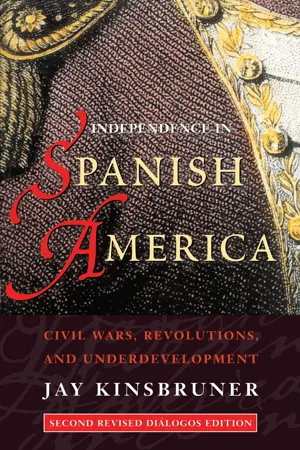Causes of the American Revolution
The causes of the American Revolution were rooted in issues such as taxation without representation, restrictions on trade, and the lack of self-governance. Tensions between the American colonies and the British government escalated due to these grievances, ultimately leading to the desire for independence and the outbreak of the Revolutionary War in 1775.
7 Key excerpts on "Causes of the American Revolution"
- eBook - ePub
A Popular History of the United States of America, From the Aboriginal Times to the Present Day
Embracing An Account Of The Aborigines; The Norsemen In The New World; The Discoveries By The Spaniards, English, And French; The Planting Of Settlements; The Growth Of The Colonies; The Struggle For Liberty In The Revolution; The Development Of The Nation; The Civil War; The Centennial Of Independence; And The Recent Annals Of The Republic. The Whole Brought Down To The Year 1889.
- John Clark Ridpath(Author)
- 2021(Publication Date)
- Left of Brain Books(Publisher)
...PART IV. Revolution and Confederation. A. D. 1775-1789. CHAPTER XXXVII. Causes. The war of American Independence was an event of vast moment, affecting the destinies of all nations. The question decided by the conflict was this: Whether the English colonies in America, becoming sovereign, should govern themselves or be ruled as dependencies of a European monarchy. The decision was rendered in favor of separation and independence. The result has been the grandest and most promising example of republican government in the history of the world. The struggle was long and distressing, though not characterized by great violence; the combatants were of the same race and spoke a common language. It is of the first importance to understand the causes of the war. The most general cause of the American Revolution was the right of arbitrary government, claimed by Great Britain and denied by the colonies. So long as this claim was asserted by England only as a theory, the conflict was postponed; when the English government began to enforce the principle in practice, the colonies resisted. The question began to be openly discussed about the time of the treaty of Aix-la-Chapelle, in 1748; and from that period until the beginning of hostilities, in 1775, each year witnessed a renewal of the agitation. But there were also many subordinate causes tending to bring on a conflict. First of these was the influence of France, which was constantly exerted so as to incite a spirit of resistance in the colonies. The French king would never have agreed to the treaty of 1763—by which Canada was ceded to Great Britain—had it not been with the hope of securing American independence. It was the theory of France that by giving up Canada on the north the English colonies would become so strong as to renounce their allegiance to the crown. England feared such a result. More than once it was proposed in Parliament to re-cede Canada to France in order to check the growth of the American States...
- eBook - ePub
- Steve Wiegand(Author)
- 2019(Publication Date)
- For Dummies(Publisher)
...These changes weren’t reliant on the desires of individual rulers or even the whims of popular opinion. They came about as the result of Americans operating under a system, which when it was created, was a radical departure from governments of the time. In the end, it may be futile to attempt to accurately categorize the American Revolution. A revolution is a massive upheaval, undertaken by a mass of human beings with different motives, aspirations — and levels of enthusiasm. For example, John Hancock was a wealthy merchant; George R.T. Hewes, a poor shoemaker. Hancock presided over the group that drafted the Declaration of Independence; Hewes helped dump tea in Boston Harbor. Neither had anything to gain directly from rebellion. But both rebelled and risked their lives in doing so. Was Hancock a conservative hoping to go back to the good old days, and Hewes a radical pining for a new way of doing things? I don’t know, and I don’t think it matters. Assigning generalized labels to their reasons may be an interesting academic exercise, but not a whole lot more. Why Did It Work? As the citizens of scores of other countries around the world can attest, not every revolution works equally well. England underwent two revolutions in the 17th century. One resulted in the dictatorship of Oliver Cromwell; the other substituted one monarch for another. The French Revolution gave France — and the rest of the world — Napoleon. The Russian Revolution transformed the government from a corrupt and despotic regime to a corrupt and totalitarian regime. But the American Revolution, however bumpy its path, succeeded. One reason was roots. Americans mostly derived their ideas about government from Britain, whose people had long wrestled with trying to balance the authority of the state with the liberty of the individual. By the time shots were fired at Lexington, many, if not most, Americans had also enjoyed decades of representative democracy, at least at the local level...
- eBook - ePub
- R. R. Palmer(Author)
- 2021(Publication Date)
- Princeton University Press(Publisher)
...THE AMERICAN REVOLUTION: THE FORCES IN CONFLICT It is a main thesis of this book that the American Revolution was a great event for the whole Eur-American world. In the Age of the Democratic Revolution the American Revolution was, after the disturbance at Geneva already recounted, the earliest successful assertion of the principle that public power must arise from those over whom it is exercised. It was the most important revolution of the eighteenth century, except for the French. Its effect on the area of Western Civilization came in part from the inspiration of its message (which in time passed beyond the area of Western Civilization), and in part from the involvement of the American Revolution in the European War of American Independence, which aggravated the financial or political difficulties of England, Ireland, Holland, and France. The climax and failure of the early movement for parliamentary reform in England, the disturbances in Ireland leading to “Grattan’s Parliament” in 1782, the Patriotentijd and revolution of 1784-1787 among the Dutch, the reform programs of Necker and Calonne and beginnings of revolution in France, and a marked enlivening of political consciousness through the rest of Europe—all described in the following chapters—were all, in part, a consequence of the American Revolution. The Revolution: Was There Any? It is paradoxical, therefore, to have to begin by asking whether there was any American Revolution at all. There may have been only a war of independence against Great Britain. The British lid may have been removed from the American box, with the contents of the box remaining as before. Or there may have been a mechanical separation from England, without chemical change in America itself...
- eBook - ePub
The Story of Religion in America
An Introduction
- James P. Byrd, James Hudnut-Beumler(Authors)
- 2021(Publication Date)
- Westminster John Knox Press(Publisher)
...6. The American Revolution The American Revolution was not primarily about religion, but religious influences were never far from it, both inspiring patriots to revolt and cautioning them to remain loyal to Britain. Many colonists, including the founders, used the Bible and religious arguments to support the Revolution and to construct the new nation. Not only did religious ideas influence the Revolutionary War (1775–83); they also set the stage for future wars. As Harry S. Stout has stated, one of the features of American history is the “symbiotic” relationship between religion and war. This was a nation founded in war; as Stout argues, “American wars are sacred wars and American religion, with some notable exceptions, is martial at the very core of its being.” This relationship between religion and war has persisted for over two centuries, with wide-ranging influence on Americans’ understanding of their nation, religion, war, and patriotism. 1 From Revivals to Revolution? Although the American Revolution centered on ideas of equality and liberty, colonial society at the time was dominated by white men in positions of power. Among the most powerful colonists were ministers, who were among the highest paid, most educated, and most respected men in society. They advised political leaders and held prestigious positions. The founder of Harvard was a minister, and ministers typically held the highest leadership positions at Harvard, Yale, and Princeton. As discussed in a previous chapter, ministers had led the Great Awakening, one of the most pervasive and most disruptive events prior to the Revolution. What, if any, was the relationship between the revivals of the “Great Awakening” in the 1740s and the American Revolution three decades later? This question has fascinated historians because it involves politics and religion, and particularly evangelicalism, an international movement that traces its American beginnings to the Great Awakening...
- eBook - ePub
Thomas Paine
Social and Political Thought
- Gregory Claeys(Author)
- 2020(Publication Date)
- Routledge(Publisher)
...2 ‘The cause of all mankind’: Paine and the American revolution Colonial radicalism, 1765–76 Common Sense exploded amidst an already volatile debate about colonial rights, imperial arbitrariness, and the possibility of resistance to British rule. American resentment had been instigated primarily by the passage of stamp duties on legal and other documents in 1765, which brought rioting and boycotts of British goods. In the late 1760s protest escalated in reaction to attempts to curtail the powers of colonial assemblies and to increase colonial revenues. The Wilkes case, as we have seen, fuelled unrest. British policy towards Ireland and India also seemed to some to betray the designs of ministerial tyranny. The failure of petitioning increased disappointments and eroded affections. More widely discussed as early as 1770–1 was armed resistance, and the view that colonial government was dissolving and might better be replaced by native rule. Independence was broached, though not widely supported, by 1772, the Dutch model being occasionally suggested. By 1774 the monarch, but a few years earlier the focus of hopes for respite from ministerial intrigue, had himself become a potent symbol of despotism. At Lexington and Concord in mid-1775 revolt finally became war. 1 Until 1776, however, the colonists’ unease produced little support for independence or strong opposition to monarchy among most colonists. As Gordon Wood has emphasized, most Americans believed the mixed British constitution to be the best possible and happily subscribed to the loyalism of John Dickinson’s popular Letters from a Farmer in Pennsylvania (1768). In this sense the majority were still British and did not yet identify, as Pauline Maier has stressed, with a self-consciously American collective entity. Paine himself claimed in early 1775 that ‘equality of liberty is the glory of every Briton...
- eBook - ePub
- Wilbur Abbott(Author)
- 2017(Publication Date)
- Jovian Press(Publisher)
...THE AMERICAN REVOLUTION. 1768-1783.................. THE FOCUS OF THE GREAT revolutionary movement which was sweeping through every department of European life in the seventh decade of the eighteenth century was the British Empire. There, for the moment, was every element of the forces then altering the world to be found in its most significant form. There the Industrial Revolution had begun; and the Agricultural Revolution been largely accomplished. There the rationalists had established themselves, and the new reformation among the Protestant sects found full expression. There Adam Smith had commenced those labors which were to alter the whole progress of economic thought in a nation already set far on the way toward popular government by the upheavals of the seventeenth century and the writings of the school of Locke. There, above all, the old school of absolutism, in new guise, stood face to face with the advancing power of the people, who, beyond the sea, had set up self-governing communities. And there, as a result of the activities of George III, the antagonism between the old and new had now become acute. With the collapse of the attempt to impose a stamp tax on America, and the disorganization of the Whigs under the attack of the crown, there had come a moment of political anarchy. Ministry dissolved into ministry, like the swift changes of a kaleidoscope. Grenville, tormenting his sovereign by his well-deserved but unpalatable homilies, antagonizing the nation by unpopular taxes and his pursuit of Wilkes, gave way to Rockingham. The Stamp Act was repealed; and jubilant America ignored the accompanying Declaratory Act, which reaffirmed the right to tax the colonies, and celebrated its victory over the mother country. When Grafton followed Rockingham, with Pitt as the chief figure in the ministry, the American agitation gradually died out, and it seemed that all might yet be well. The radicals were correspondingly depressed, the ministry encouraged...
- eBook - ePub
Independence in Spanish America
Civil Wars, Revolutions, and Underdevelopment. Revised edition.
- Jay Kinsbruner(Author)
- 2000(Publication Date)
- University of New Mexico Press(Publisher)
...2 The Causes of Independence The Spanish American independence movements were by-products of the Napoleonic seizure of the Spanish throne in 1808. In accordance with traditional Spanish political theory, and in some cases propelled by a concurrence found in the Enlightenment, and following the example of Spain itself, many of the colonies began to govern themselves in the name of the deposed king. When Ferdinand was restored to the throne and proclaimed the return of royal absolutism in 1814, many colonists decided to seek more formal and truer independence. It was clear now that the imperial state could not accommodate the requirements of colonial economies whose growth rates were irregular, and in some instances retarded. After several years of actual self-government and the enjoyment of many locally determined reforms and freedoms, including instances of political liberty, the thrust toward independence grew irresistible. In an age of change and turmoil, in which compelling examples of revolution and independence preceded them, many colonists experienced little trouble in finding both political and economic reasons for a break with the mother country. Four causes of Spanish American independence are often cited: the Enlightenment, the Bourbon reforms, the creole-peninsular controversy, and the late colonial revolts and protests. This chapter is concerned with the first three causes, those aspects of the late colonial period that led some Americans, such as Francisco Miranda and Bernardo O’Higgins, to become active advocates of independence prior to the Napoleonic invasion of the Iberian peninsula and that encouraged others to embrace independence once the invasion had taken place...
